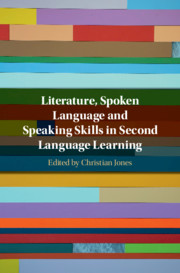Book contents
- Literature, Spoken Language and Speaking Skills in Second Language Learning
- Literature, Spoken Language and Speaking Skills in Second Language Learning
- Copyright page
- Contents
- Figures and Tables
- Contributors
- Foreword
- Acknowledgements
- 1 Introduction
- Part I Literature and Spoken Language
- Part II Literature and Speaking Skills
- 7 EFL Learners Reading and Discussing Poems in English
- 8 An Analysis of Collaborative Dialogue in Literature Circles
- 9 Exploring Literary Texts as a Tool for Developing L2 Oral Proficiency
- 10 Conclusion: Implications for Pedagogy and Research
- Index
- References
7 - EFL Learners Reading and Discussing Poems in English
from Part II - Literature and Speaking Skills
Published online by Cambridge University Press: 18 October 2019
- Literature, Spoken Language and Speaking Skills in Second Language Learning
- Literature, Spoken Language and Speaking Skills in Second Language Learning
- Copyright page
- Contents
- Figures and Tables
- Contributors
- Foreword
- Acknowledgements
- 1 Introduction
- Part I Literature and Spoken Language
- Part II Literature and Speaking Skills
- 7 EFL Learners Reading and Discussing Poems in English
- 8 An Analysis of Collaborative Dialogue in Literature Circles
- 9 Exploring Literary Texts as a Tool for Developing L2 Oral Proficiency
- 10 Conclusion: Implications for Pedagogy and Research
- Index
- References
Summary
This chapter explores Japanese EFL learners’ responses to poems of different levels of familiarity. The aim of the project was to try to uncover learners’ interactions with poetry and then to consider the benefits of speaking about poetry for second language learning. A Japanese poem by Kenji Miyazawa in English translation was used as a familiar text, and a Dylan Thomas poem as an unfamiliar poem. Four pairs of learners were asked to talk together about the poems and report on what they understood the poems to mean. They were also asked to give a personal response to the poems. It was anticipated that in speaking about the familiar poem, learners’ background knowledge of the Japanese text would support a more detailed interpretation, while the unfamiliarity of the new poem would present barriers to understanding of meaning but could present opportunities for co-constructed meaning creation through speaking. Three sources of data are used in the chapter: (1) a bilingual questionnaire which identified learners’ poetry-reading backgrounds; (2) the learners’ conversations, used to explore spoken responses to the two poems; and (3) follow-up interviews. The results indicate that poetry-reading processes such as noticing, questioning and interpreting meaning occur with both types of poem. The results also suggest that speaking about poetry could be useful for the development of speaking skills such as elaborating, negotiating and also practising specific spoken language such as use of discourse markers and conversation skills. The results also suggest that poetry discussions may help learners to express their feelings in English, which could develop their familiarity with conversational strategies when using their speaking skills in future situations.
- Type
- Chapter
- Information
- Publisher: Cambridge University PressPrint publication year: 2019

